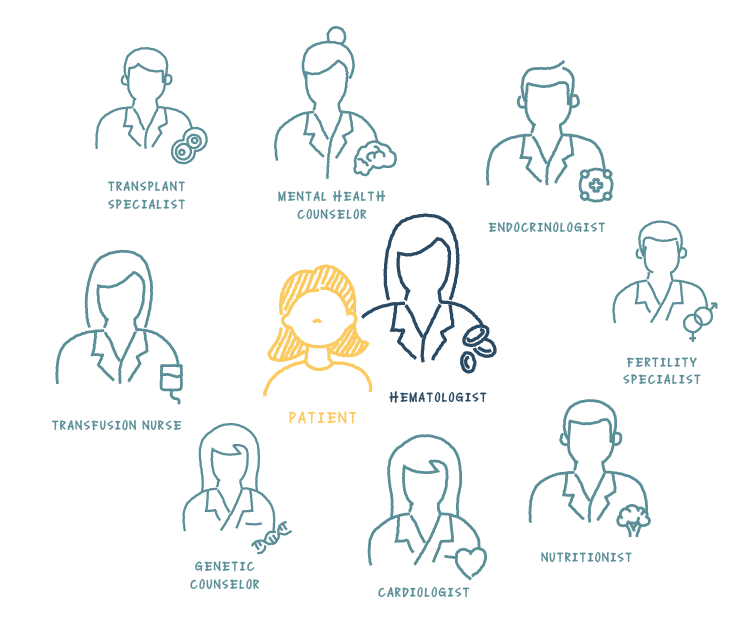

LIVING WITH BETA-THALASSEMIA
COMPREHENSIVE
CARE
Everyone’s experience with beta (β)-thalassemia is different, including their goals and the level of support they may want or need. The following information may help you plan for the future, understand how to build a care team, and learn how to get the support that is right for you.
Long-term Goals
As you age, addressing all aspects of beta-thalassemia with your care team is essential.
Whether you need to make a change to your transfusion schedule, are considering other treatment options, or are reaching new milestones in life, it’s always a good opportunity to evaluate your long-term goals and discuss them with your doctor.
Here are some examples of when this might happen:
- Changing schools
- Participating in new sports or activities
- Moving or changing primary hematologists (transitioning from pediatric to adult care)
- Living away from home for the first time/going away to college and managing care without daily caregiver support
- Starting a job or career and managing a full-time/regular schedule
- Relationships and family planning
- Taking care of others while taking care of yourself
- Extended travel, time abroad, or immersive experiences
If you experience any of these things, bring them up at your annual comprehensive care visit.

Reach your treatment goals
The Goals Guide is a useful tool that can help you set short- and long-term goals to share with your care team.
Building Your Care Team
Comprehensive care for beta-thalassemia can mean different things to different people. A team of doctors can provide you with comprehensive care that monitors the symptoms and manages the complications of beta-thalassemia before they progress. Depending on your healthcare needs, your care team may include:

*This advocacy organization is independent from bluebird bio, Inc. and is being shared as a resource only.

“It gives you so much more freedom when you’re being honest and not trying to hide the truth of your experience and who you are.”
Josephine
actual beta-thalassemia patient
Starting the conversation
Once you have decided what your long-term goals are, you can begin discussing them with your care team. Being open and honest about what you want to work toward will help them provide care that is right for you. It can also help your doctor determine if any adjustments can be made to your treatment plan so it better aligns with your long-term goals for managing your beta-thalassemia.
Assessing Care Over Time
If you and your doctor are not able to align on a path forward or you are just looking for different perspectives, you can seek the opinion of another doctor. Patient advocacy groups can help put you in touch with a new beta-thalassemia specialist. Remember, as your life changes, your needs may change as well. It's important that you feel you can trust your doctor with your health and personal goals.
Get the Support You Need
Managing beta-thalassemiaBeta-thalassemiaa genetic blood disorder that reduces or eliminates the production of beta (β)-globin on your own can be difficult. It’s good to remember you are not alone. Building a strong support team can help you gain the strength and confidence to face any obstacles that may arise.
As you build your personal support team, consider including different types of people and resources that can help you in unique ways:
- Friends and family
- Your nurse and/or doctor
- A social worker or mental health professional
- Thalassemia communities and organizations
Your friends and family
Your loved ones are there to help you in any way they can and are an important part of your support team.
Your doctors
Make sure you have the right doctors on your team. Your care team of doctors can include a hematologist, cardiologist, and more.
How to Ask for Help
There are times when you may be able to navigate your personal life, work, and treatment commitments without an issue. However, sometimes beta-thalassemia can make it challenging to manage day-to-day tasks.
Some people may find that their condition causes feelings of anger, shame, anxiety, or sadness. Sharing your thoughts and feelings with your support team can help you get the support you want.
Remember that it’s okay to ask for help; your support team is there for you every step of the way. You can ask them:
- For a ride to a doctor’s appointment
- To accompany you to a transfusion
- To simply listen to how you’re feeling that day (physically or emotionally)
If you continue to experience feelings of distress or sadness, talk with your doctor or a specialist who can provide you with more support.

Need help explaining the impact of TDT to others?
We’ve created an educational tool that you can share with others to teach them about beta-thalassemia and how it might affect you or your loved one’s daily life.
 This website is developed by bluebird bio, Inc. and is intended for residents of the United States who are 18 years and older.
This website is developed by bluebird bio, Inc. and is intended for residents of the United States who are 18 years and older.
Social Worker or Mental Health Professional